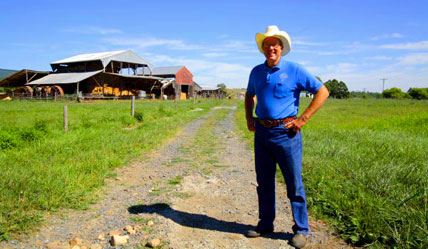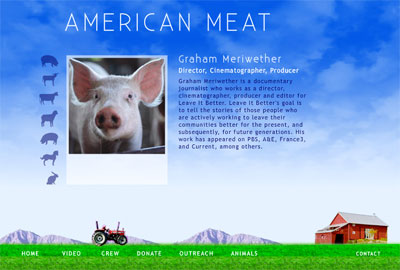








- Amee Farm
- Bloom for Life (Trish the florist)
- CV oil
- Gramps Shuttle
- Historic Society
- Kayak King
- Mad Motion
- Picarellos
- Pittsfield Auto Repair
- Pittsfield Library
- RC Williams Architects
- Riverside Farm
- Rock Shop
- Stone Revival
- The Casa Bella Inn
- The Clear River Inn
- The Clear River Tavern
- The Original General Store
- The Pittstop
- The Swiss farm Inn
- Tubing
- Tweed River Farm
- Tweed River Video
- Tweed Valley Video

Joel Salatin
Joel F. Salatin (born 1957) is an American farmer, lecturer, and author whose books include You Can Farm and Salad Bar Beef. Salatin raises livestock using holistic methods of animal husbandry, free of potentially harmful chemicals, on his Polyface Farm in Swoope, Virginia, in the Shenandoah Valley. Meat from the farm is sold by direct-marketing to consumers and restaurants.
Biography

In high school, Salatin began his own business selling rabbits, eggs, butter and chicken from his family farm at the Staunton Curb Market. He then attended Bob Jones University where he majored in English and was a student leader. He graduated in 1979. Salatin married his childhood sweetheart in 1980 and became a feature writer at the Staunton, Virginia newspaper, the News Leader, where he had worked earlier typing obituaries and police reports.
Tired of "having his stories spiked," he decided to try farming full-time. His grandfather had been an avid gardener and beekeeper and a follower of J. I. Rodale, the founder of regenerative organic gardening. Salatin's father worked as an accountant and his mother taught high school physical education. Salatin's parents had bought the land that became Polyface after losing a farm in Venezuela to political turmoil. They had raised cattle using organic methods, but could not make a living at farming alone.
Salatin, a self-described "Christian-libertarian-environmentalist-capitalist farmer" produces high-quality "beyond organic" meats, which are raised using environmentally responsible, ecologically beneficial, sustainable methods. Jo Robinson, the author of Pasture Perfect: The Far-Reaching Benefits of Choosing Meat, Eggs and Dairy Products From Grass-Fed Animals (2004) said of Salatin, "He's not going back to the old model. There's nothing in county extension or old-fashioned ag science that really informs him. He is just looking totally afresh at how to maximize production in an integrated system on a holistic farm. He's just totally innovative."
Salatin considers his farming a ministry, and he condemns the negative impact on his livelihood and lifestyle of what he considers an increasingly regulatory approach taken by the agencies of the United States government toward farming. Salatin now spends a hundred days a year lecturing at colleges and to environmental groups.
Salatin's farm
Main article: Polyface FarmSalatin's 550-acre farm is featured prominently in Michael Pollan, The Omnivore's Dilemma (2006) and the documentary film, Food, Inc. His unconventional farming practices have drawn attention from the alternative agriculture community especially those interested in sustainable livestock management. For example, Pollan became interested in Salatin because of his refusal to send food to locations not within a four-hour drive of his farm, i.e. outside his local "foodshed." "We want [prospective customers] to find farms in their areas and keep the money in their own community," said Salatin. "We think there is strength in decentralization and spreading out rather than in being concentrated and centralized."
Salatin’s philosophy of farming emphasizes healthy grass on which animals can thrive in a symbiotic cycle of chemical-free feeding. Cows are moved from one pasture to another rather than being centrally corn fed. Then chickens in portable coops are moved in behind them, where they dig through the cow dung to eat protein-rich fly larvae while further fertilizing the field with their droppings.

Visit: http://www.americanmeatfilm.com/